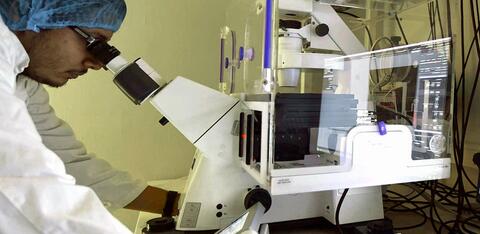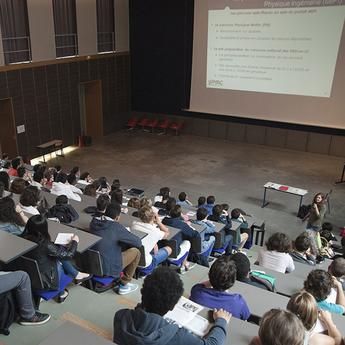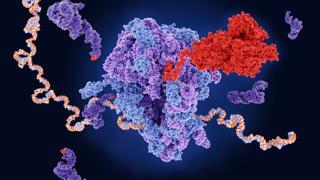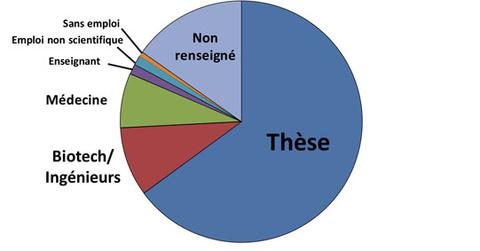
M2 - Genetics and Epigenetics track
Genetics studies the structure, expression, maintenance and transmission of genes and genomes. It is a cross-disciplinary, multi-scale discipline that can be applied to the study of any mechanism in biology (evolution, development, immune system function, nervous system function, ecosystems, etc.), from single cells and molecules to ecosystems, organisms and populations. This cross-disciplinary approach is reflected in the themes shared with other courses (Cell Biology, Developmental Biology and Stem Cells, Biochemistry and Molecular Biology, Bioinformatics, Immunology), Sorbonne University's Faculty of Health and Parisian universities. Complementing molecular, cellular and immune approaches, genetics also makes an important contribution to the study of complex diseases, and in particular to oncology and the study of genetic diseases.
Genetics is constantly evolving, and in recent years has undergone a series of technical and theoretical upheavals. The aim of the course is to train young geneticists from scientific or medical backgrounds to keep abreast of these recent developments, and to meet the technological, conceptual and societal challenges currently posed by this rapid evolution of the discipline.
Organisation
Following an interview during which the student presents his or her career plan to the course's teaching team, five subjects are proposed:
- Molecular basis of oncogenesis (BMO)
- RNA Biochemistry and Genetics (BGA)
- Genetics and medical genomics (Gen2Med)
- Genome, Epigenetics and Human Genetics (GEpiGeH)
- Immunology, Genetics & Oncology (IGO)
These subjects will enable students, through practical and theoretical teaching, to familiarise themselves with techniques such as high-throughput sequencing, DNA chips, single-molecule imaging and transgenesis in animal models, as well as with more conceptual aspects such as the importance of epigenetic regulation in the expression of traits and the maintenance of genomes, the incredible diversity of non-coding RNAs, the wide variety of mechanisms involved in oncogenesis, the many factors that influence the structure and evolution of molecular polymorphisms within populations, and the lessons learned from analysing the genetic diversity of human populations and microbial flora. A long placement in a research laboratory or company will enable students to perfect their practical and theoretical training, while gaining a foothold in what will be, for many of them, their future professional environments.

Molecular Bases of Oncogenesis (BMO) (in partnership with the Cell Biology, Development & Stem Cells theme), which covers all aspects of the biology and genetics of tumours.
Key words: Cancer; Genetic instability; DNA recombination, replication and repair; Murine models; Cell signalling; Development; Stem cells, Epigenetic regulation.
General presentation of the subject
The "Molecular Bases of Oncogenesis" subject, which is common to the "Cell Biology, Developmental Biology & Stem Cell Biology" and "Genetics" patheways, enables students to develop the essential concepts needed to understand the biological processes that control the cell cycle and maintain genome integrity, and how these processes are altered during tumour initiation or progression. Depending on the specialisation course chosen, these areas are studied at the level of the cell or the whole organism. By combining seminars and practical work, the specialisation courses – delivered in partnership with the Institut Pasteur and the Institut Curie – incorporate the most recent concepts and techniques in biology, such as (depending on the course chosen): 1) molecular combing to understand the mechanisms of genetic instability and chromatin immunoprecipitation to analyse the functional relationships between DNA lesions and chromatin remodelling; 2) the targeting of conditional mutations in the mouse genome to control the activation of oncogenes or the inactivation of tumour suppressors, or the reprogramming of fibroblasts into stem cells, whose properties are similar to those of cancer cells; 3) the in vitro reconstitution of cellular functions, and the visualisation of cellular constituents using the most recent methods of confocal microscopy and dynamic imaging, to study the functional organisation of the cell.
The subject includes two specialisation courses which, in their diversity, address all aspects of tumour biology and genetics.
The goal of the Molecular Genetics and Epigenetics course (MU5BM824) is to develop the technical and conceptual aspects of genetics and epigenetics research, particularly in the context of oncogenesis. It aims to analyse the mechanisms regulating the expression and stability of eukaryotic cell genomes, as well as those controlling progression through the cell cycle.
The Mouse Genetics course (MU5BM813) is designed for students wishing to undertake comprehensive training in the use of this animal as a model system for human pathologies, particularly cancer. It is also aimed at students interested in stem cell biology (ES cells, IPS, etc.) or developmental biology – as such, it can be taken by students in the 'Stem cell biology' and 'Developmental biology' subjects of the 'Cell biology, developmental biology & stem cell biology' Cell Biology pathway.
Educational organisation
Students will choose one of the two specialisation courses described above, which are delivered in partnership with the Institut Pasteur. These UEs also include the project UE and count for 18 ECTS.
They will also take the scientific analysis UE (6 ECTS) of their attached course.
Students must complete their training by choosing 6 ECTS of introductory UE(s) from the training offered by Sorbonne University or other universities, the choice of which will be discussed with the teaching team. The introductory modules recommended for the BMO theme are the Institut Curie courses "Non-coding genome" (MU5BM429) (6 ECTS), "Epigenetics, chromatine et organisation du noyau" (MU5BM460) (6 ECTS) and "Biologie cellulaire et cancer" (MU5BM222) (3 ECTS) and the Sorbonne Université courses "Microenvironnement immunitaire, apoptose et cancer" (MU5BM577) (3 ECTS) and "Prolifération et mort cellulaire" (MU5BM285) (3 ECTS).
Finally, before the end of September, students must find an internship in a research laboratory (30 ECTS). The choice of laboratory and placement topic is made in consultation with the teaching staff. The list of host teams and internship proposals can be reviewed on the BMC Master's website (restricted access, please contact us) and at with the Pedagogical secretary with, Carine Joseph. Students may do their placement in a laboratory not on the list, subject to the agreement of the teaching team. The placement lasts for the entire academic year, with the exception of the periods occupied by the UEs described above. It is assessed through a written report and a viva at the end of June, to enable students who wish to pursue a doctorate to prepare their applications at the beginning of July.
Contacts
Secrétariat pédagogique
Responsable pédagogique
RNA Biochemistry and Genetics (BGA)
(Subjects shared by the 'Biochemistry & Molecular Biology' and 'Genetics and Epigenetics' pathways)
Key words: RNA worlds; Gene expression; Regulatory RNA; RNA interference; Ribozymes; RNAomics; New RNA methodologies and modelling; RNA/DNA/protein interactions; Molecular evolution of RNA; Therapeutic and medical applications.

Source : © Getty - JUAN GAERTNER/SCIENCE PHOTO LIBRARY
Training objectives
The field of RNA is undergoing rapid (r)evolution, with the recent discovery of a multitude of new types of RNA (small and long non-coding RNAs, circular RNAs) and a very large number of chemical modifications on these RNAs, regulating their fate and functions (giving rise to the concept of epitranscriptomics, by analogy with epigenetics).
RNA plays an essential role in gene expression, through rRNAs, tRNAs and mRNA translation, but also through the very large number of genetic and epigenetic regulations carried out by non-coding RNAs. It must also be emphasised that RNA plays an important role in maintaining the genome. Dysfunctions in these regulations are at the core of many pathologies (cancers, cardiovascular and neurodevelopmental diseases).
Recent events have reminded us that RNA can also be an infectious molecule, being the basic element of retroviral genomes (Covid-19, HIV, etc.). Moreover, RNA can be a therapeutic molecule, through the use of CRISPR, interfering RNA or aptamers to correct genetic defects or to target certain cancer cells for better destruction.
The aim of the BGA subject is to train high-level specialists capable of exploring biological processes involving RNA. To this end, our training programme is developing a wide range of study methods and concepts relating to RNA, at the interface of biochemistry/molecular biology and genetics (epitranscriptomics, structure-function relationship of RNA, RNA-protein and RNA-RNA interactions, RNA and epigenetic processes, complexity of splicing mechanisms, control of gene expression, RNA and evolution).
A one-day symposium on 'Multiple aspects of RNA' (in English), with numerous experts from the world of RNA, is an integral part of this course.
Cohort
12 to 20 students
Educational organisation
The specialisation course 'RNA Biochemistry & Genetics' (MU5BM823, 12 ECTS) consists of a common core (60 h) taken by all students in the subject area. At the end of this core curriculum, students enrolled in the "Biochemistry & Molecular Biology" pathway will specialise further by taking the "Biochemistry & Molecular Biology of RNA" option (60 h), while students enrolled in the "Genetics" pathway will take the Pasteur course "Multiple roles of RNA: RNAomics" (60 h).
The project unit (MU5BM091, 6 ECTS) consists of the presentation of the internship project to a panel of biochemists and geneticists.
The scientific analysis unit (MU5BM051, 6 ECTS) consists of presenting scientific themes supported by the analysis of scientific articles proposed by the lecturers and/or teacher-researchers involved in the courses and conferences.
The introductory UE (6 ECTS) can be chosen from those offered by Sorbonne Université or other higher education establishments. It should be noted that the Pasteur course "Multiple roles of RNA: RNAomics" (MU5BM817, 6ECTS) can be taken as an introductory course by students enrolled in this subject via the "Biochemistry & Molecular Biology" pathway.
The "Specialisation internship" UE (MU5BMSO6, 30 ECTS) requires students to find an internship in a research laboratory before the end of September. The choice of laboratory and placement topic is made in consultation with the teaching staff.
Topics covered
- Regulation of gene expression: non-coding RNAs, regulatory RNAs, splicing, intronic polyadenylation, epigenetics. - Protein/RNA interactions: structure/function studies, structural biochemistry, cryo-electron microscopy, spectroscopy, biological NMR. - Transcriptome and epitranscriptomics: next-generation sequencing (RNA-seq), cellular transcripts, RNAomics. Diversity and functions of modified nucleotides. - Degradation, stability and localisation of RNAs. - Medical, therapeutic and biotechnological applications. RNAs as regulators of biological processes. Dysfunctions and pathologies, biomarker RNAs, drug design. - Circular RNAs - Ribozymes / Telomeres. - Viral RNA: viroids, HIV-RNA, viral translation, RNA vesicles, interfering RNA. - Evolution - Phylogeny: bioinformatics analyses, origins of living molecules, modelling.
Student careers
This subject is essentially research-oriented, with many students continuing on to doctoral studies. Thesis topics are in the fields of life and health, chemistry and medicine, both in the public sector and in the pharmaceutical and/or biotechnology industries. Other students choose to go straight into the workforce as research engineers, technical sales representatives, clinical research associates or secondary school teachers.
Contacts
Responsable pédagogique
Secrétariat pédagogique
The aim of this theme is to introduce students in medicine, pharmacy (during their year of availability for a Master 2 degree) or science to the tools of genetics and genomics, with a focus on current medical applications (diagnostics, therapeutics).
Medical genomics has developed strongly in recent years, thanks in particular to advances in human genome sequencing techniques and the rapid expansion of their applications in most medical specialties. Interpretation of the vast quantities of data generated is based on the rapid development of in silico genome and transcriptome analysis tools. These new tools enable us to perfect predictive algorithms and improve diagnosis and patient care. These approaches provide a better understanding of the origins of genetic diseases, and make it possible to propose innovative targeted therapies for numerous pathologies.
This interfaculty training program, set up by a teaching team from the BMC Master's program and Sorbonne University's Faculty of Health, will provide the keys to understanding and studying the origins of human diseases, by making students aware of the tools of human genetics and systems biology applied in human health for monogenic or complex diseases.
Responsables pédagogiques :
Secrétaire pédagogique:
M2 - Genetics, Epigenetics & Human Genetics
The "Genome, Epigenetics and Human Genetics (GEpiGeH)" subject provides training in the analysis of genomes and epigenetic modifications, from a fundamental or applied perspective.
Key words: Genomics, epigenetics, high-throughput sequencing, genetic resources, molecular polymorphisms, genome evolution, evolutionary genetics, population genomics, genetics of multifactorial traits.
General presentation of the subject
Over the last ten years or so, the emergence of new techniques, from DNA chips to high-throughput sequencing, and the discovery of innovative concepts such as non-coding RNAs and epigenetic regulation, have revolutionised genetics. Genomics, which studies the composition and expression of a genome, has therefore developed considerably. It is now present in all areas of the Life Sciences and its importance is growing, particularly in understanding human pathologies. It is, however, a complex science that is developing in many directions, such as epigenomics, which studies the influence of environmental modifications on the expression of a genome, structural, functional and comparative genomics, and metagenomics, all of which make it possible to understand evolutionary issues. This discipline requires specific training for those who want to be able to understand its rapid developments and apply them in their professional lives.
Educational organisation
This teaching unit aims to introduce students to the fundamental concepts, tools, main achievements and prospects of genomics and epigenomics. The course is available in three options, which are organised around common elements: courses and lectures given by specialists in their field; a practical part of bench-top molecular biology based on high-throughput approaches and/or the analysis of computer-generated data. The aim of this teaching is to make students self-sufficient in the various aspects of genomic analysis in general, which are useful for research in this field as well as in many applications of modern biological sciences.
Depending on the option chosen, the organisation will differ, but certain principles are common to the whole Teaching Unit. The courses and practical work are set up by a small teaching team which monitors the students throughout their course. Supervision is extensive and provided by specialists in the field. Sufficient resources are made available (the teaching centre at the Institut Pasteur, classrooms at the École normale supérieure and the IT infrastructure at Sorbonne Université) to enable students to work individually.
Finally, assessment is carried out as closely as possible to the exercises that will be offered and the skills required in a professional environment (project, oral presentations, etc.).
Topics covered during the specialisation course
The subject can be broken down into the following options:
- The 'Genome Analysis' option is based on the Pasteur course of the same name (MU5BM421). The teaching is organised around a theoretical core consisting of lectures given by specialists, practical work in the laboratory on high-throughput approaches, and training in data analysis on computers.
- The 'Human Genetics' option is based on the Pasteur course in human genomics and genetic epidemiology (MU5BM461) and a selection of courses from the École normale supérieure on the applications of high-throughput analysis in the medical field.
- The 'Evolutionary Genetics' option comprises either a choice of courses at Sorbonne University and the Ecole Normale Supérieure on the evolution of genomes and the genetics of populations, conservation and biodiversity, or a programme titled Evolution of Genomes, Populations and Species: Data and Models (EvoGEM, https://evogem.fr/); inter-institutional (SU, MNHM, ENS, UP, Paris-Saclay), contact EvoGEM Pr Ingrid Lafontaine
- The 'Bioanalysis' option offers training in bioinformatics based on the teaching units MU5BM011, MU5BM012, MU5BM013 and MU5BM014.
- Students complete their training by taking a scientific analysis UE common to all four options, a scientific project UE, and by choosing an introductory UE from among the UE of 3 or 6 ECTS offered by Sorbonne Université, the Institut Curie, the École Normale Supérieure or the Institut Pasteur (for example: MU5BM461, MU5BM429, MU5BM460, MU5BM096). Finally, students must complete a long placement in a research laboratory or company (30 ECTS).
Prerequisites
Candidates should have strong knowledge of genetics, molecular biology and biochemistry at the level of the end of the first year of the master's programme. No pre-requisites are required in computer science for the first two options. The bioinformatics methods required for data analysis will be taught during the course. For the "bioanalysis" option, basic programming skills are required.
Objectives and contents
The immunology and genetics courses are combined in a new theme entitled IGO standing for "Immunology, Genetics and Oncology", which leads to a double specialisation in genetics and immunology. The objective of this theme is to acquire a solid training in integrative cancer research by tackling aspects of cancer genetics, translational and systemic immunology, as well as gene and cell therapy. The pedagogical contract for students following this theme will include both courses associated with the immunology programme and courses from the genetics programme. Candidates for this theme can apply, according to their profile, either within the framework of the genetics course or the immunology course.
Publics and pre-requisite
As the number of students in this field is very limited, candidates must be highly motivated to acquire this double specialisation and to carry out research in the field of cancerology, and must have completed the genetics and immunology courses in M1. In addition, a good understanding of English is required as most of the teaching will be in English.
Keywords
Immunology, Oncology, Murine model
Organisation
The educational pathway organisation of each student depends on the program she/he is enrolled in, although the content is the same:
Genetic program
Immunology program
Credits
Specialization
Pasteur Mouse Genetics course (MU5BM813)
"Molecular, cellular and gene immunotherapy"(MU5BM564), "Data Analysis in Immunology” (MU5BM578), "Lecture in Systems Immunology" (MU5BM560) & "Anti-tumour immunology" (MU5BM558)
12 ECTS
Project course (MU5BM091)
Mouse Genetics course
Mouse Genetics course
6 ECTS
Scientific Analysis (MU5BM051)
"Molecular, cellular and gene immunotherapy"(MU5BM564) & "Data Analysis in Immunology” (MU5BM578)
Pasteur Mouse Genetics course (MU5BM813)
6 ECTS
Opening course
"Lecture in Systems Immunology" (MU5BM560) & "Anti-tumour immunology" (MU5BM558)
Pasteur Mouse Genetics course (MU5BM813)
6 ECTS
internship
research project in immuno-oncology and genetics
research project in immuno-oncology and genetics
30 ECTS
Contacts
Each student's pedagogical project is drawn up in consultation with the teaching team for the chosen theme and course.
This project comprises 12 ECTS of specialization UEs (determined by the theme followed); 6 ECTS of project UEs (consisting in the creation and presentation of a fictitious research project); 6 ECTS of opening UEs that can be taken in any course or mention of Sorbonne Université or other establishments; and 6 ECTS of scientific analysis (where students present the scientific context of their internship subject). The second semester is devoted to a research internship (30 ECTS) in a laboratory or company, in France or abroad. The internship defense and the scientific analysis UE are validated by a jury representing all themes.
At M1 level , a large number of courses are offered by the genetics pathway, often in partnership with one or more other pathways. The choice of courses depends on each student's individual project, and is discussed during the pedagogical orientation days following the start of the M1 year.
Job opportunities
On completion of their training, students can move into fundamental or applied research, in public bodies or private companies. This can be done either by preparing a doctoral thesis (50 to 80% of students in the program, depending on the year), or directly after the Master's degree, by obtaining a contract as a research engineer, or equivalent. Some students also choose to go back to school, either as a continuation of their initial career plans (doctors, pharmacists, engineers, police officers, etc.), or to acquire dual skills (bioinformatics, marketing, management, development, journalism, etc.).
The (non-exhaustive) list of positions currently held by former students of the course includes : teacher-researchers and researchers in public research organizations (French and foreign universities, CNRS, CEA, INSERM, INRA,... ) or under private law (Institut Pasteur, R&D companies), research engineers, business managers for local authorities, medical information officers in the pharmaceutical industry, conformity assessors in health monitoring agencies, biotechnology sales technicians, clinical research attachés, secondary school teachers, etc.
Graduates' career paths

Target groups and admission
The M2 intake is around 40 students per year, spread over the three themes. The course is open to students in scientific (Master 1 or equivalent) and medical (medicine, pharmacy, veterinary) fields at French or foreign universities, as well as to engineering school students. The course can also be taken as part of a continuing education program, on the understanding that it is a full-time, full-year course.
Admission is by application on the Sorbonne-Université application and registration website. Students whose applications have been pre-selected are then called for an interview with the teaching team in June.
Skills
Disciplinary skills
- In-depth knowledge of biology in general and specialized knowledge in certain disciplinary fields related to genetics
- Knowledge of the main principles of modern genetics and recent technological developments
- master the basic techniques and equipment used in biochemistry, molecular genetics, cell genetics, cell biology or statistical and bioinformatics analysis of sequence data
- Know how to apply these techniques and methods to different questions in biology.
Cross-disciplinary skills
- Technological watch: know how to manage bibliographic resources (databases, on-line scientific journals); master the scientific literature related to your professional field and be able to synthesize it.
- Expertise: Ability to critically analyze scientific results (one's own and those of others). Appreciate the quality and relevance of a scientific work or approach.
- Advice: use knowledge and creativity to pose and solve a scientific problem using an experimental approach.
- Integration/evolution in the professional environment: Ability to learn and adapt. Ability to organize work and work as part of a team. Ability to communicate results (oral or poster presentations, written reports) and defend a project in front of adversaries. Fluency in scientific English.
Contacts
Responsable pédagogique
Pr. Laure Teysset
Secrétariat pédagogique
Marina Pavlopoulos
